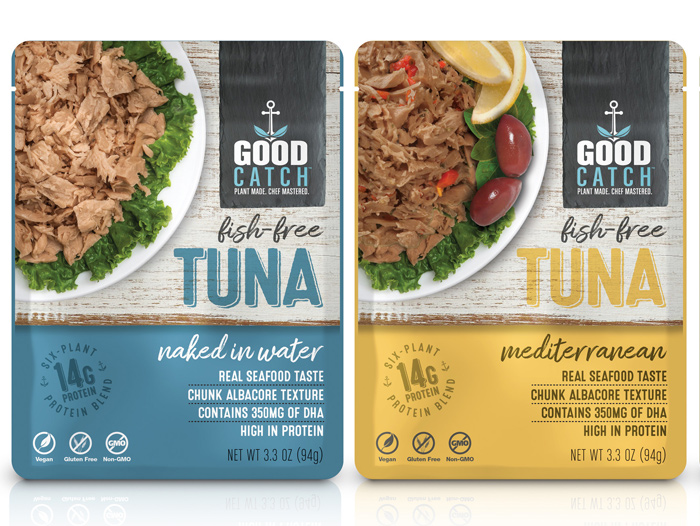Good Catch Plant Based Tuna Makes National Debut With Major Retailers
February 20, 2019 | 5 min to read

NEW YORK — Good Catch is about to make a splash in the world of seafood. On February 20, Whole Foods Market and Thrive Market will be the first retailers to carry the chef-mastered, award-winning, shelf-stable plant based Tuna nationwide.
On a mission to protect the oceans’ natural resources while still enjoying its delectable flavors, the Good Catch team has created plant based proteins that indulge the taste buds and offer a healthy solution to serious problems:
- Ocean crisis: Nearly 90% of the world’s marine fish stocks are now fully exploited, overexploited, or depleted (1, 2). Scientists predict that global fisheries may totally collapse by 2048 (3).
- Health risk: Fish often contain high levels of mercury, PCBs, dioxins, and other dangerous contaminants (4, 5).
- Factory farms/Aquaculture: Nearly half the world’s fish production derives from intensive confinement farming where cruelty, disease, and threats to the genetic diversity and survival of native species are endemic (6).
Good Catch satisfies the enormous global appetite for sea life and offers lovers of seafood the best of both worlds: 100% plant based products that deliver the maximum on seafood taste, texture, and nutrition with minimal impact on the planet and fragile ocean ecosystems. In short, seafood without sacrifice! Co-founded by renowned chefs, Wicked Healthy authors, and plant based culinary pioneers, Chad and Derek Sarno, Good Catch masterfully delivers the ocean flavor and flaky texture of chunk albacore tuna. Available in convenient 3.3oz pouches, ready-to-eat Plant Based Tuna is packed with flavor and crafted with healthy, sustainable ingredients:
- Beneficial Omega-3 fatty acids
- A proprietary six-legume blend
- 14g of protein per serving
- Superior umami flavor from sea algae oil
- Free of gluten, dairy, GMOs
- Free of mercury, toxins, plastics, and microfibers
- Safe and enjoyable for those with shellfish allergies
- Available in three flavors: Naked in Water, Mediterranean, and Oil & Herbs
“We’ve created a true tuna texture and taste profile,” said Good Catch Co-Founding Chef Chad Sarno. “Good Catch products are a one-to-one swap in any recipe that calls for tuna, and can be the centerpiece of any entrée, sandwich, chowder, or salad. Plant based Tuna is the culmination of our experience as plant-based chefs, combined with our passion for healthy eating as well as animal and environmental welfare. We’re redefining seafood for omnivores and plant based eaters alike.”
Good Catch is the first plant based brand that truly rivals animal seafood. “Our mission is to disrupt the seafood category with delicious plant based options,” said Good Catch co-founder and CEO Chris Kerr. “And give consumers everything like they like about seafood, but without the mercury poisoning.”
Enjoy seafood without sacrifice at Whole Foods Market and www.thrivemarket.com and learn more at www.goodcatchfoods.com. Plant-based Tuna is coming soon to other fine grocers across the nation.
ABOUT GOOD CATCH™
The Good Catch team have created a mouthwatering masterpiece that serves up the taste, texture, nutrition, and experience of seafood – without the worry about mercury or micro plastics. Striving to find solutions to the critical problems facing our oceans, Good Catch is on a mission to raise awareness, reduce harm, and protect resources with its chef-created, healthy, plant based offerings. Good Catch plant based tuna is for all kinds of eaters – from health-focused to comfort foodies – and is available in single-serve, ready-to-eat pouches in three flavors: Naked in Water, Oil & Herbs, and Mediterranean. www.goodcatchfoods.com. @goodcatchfoods
1. United Nations. (2018). 90% of fish stocks are used up – fisheries subsidies must stop. Retrieved from https://unctad.org/en/pages/newsdetails.aspx?OriginalVersionID=1812
2. FAO. Fisheries. (2019). Retrieved from http://www.fao.org/fisheries/en/
3. Worm, B., Barbier, E. B., Beaumont, N., Duffy, J. E., Folke, C., Halpern, B. S., … & Sala, E. (2006). Impacts of biodiversity loss on ocean ecosystem services. science, 314(5800), 787-790.
4. Harvard Health Publishing. (2004). Getting your omega-3s vs. avoiding those PCBs. Retrieved from https://www.health.harvard.edu/staying-healthy/getting-your-omega-3s-vs-avoiding-those-pcbsthe-family-healthguide
5. United States Environmental Protection Agency. (2018, June 26). How People are Exposed to Mercury. Retrieved from https://www.epa.gov/mercury/how-people-are-exposed-mercury
6. FAO. (2018). SOFIA 2018 – State of Fisheries and Aquaculture in the world 2018. Retrieved from http://www.fao.org/state-of-fisheries-aquaculture
